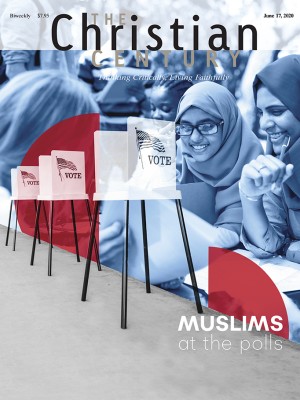Wearing down structural evil with the ministry of erosion
During the pandemic, our church’s justice work has gone online.

The COVID-19 pandemic has grandly clarified the inequalities that lock American families and workers in ongoing economic jeopardy. The pandemic is not creating new economic vulnerabilities as much as it is exposing the generations-long political abandonment of tax-paying, voting people whose hard work keeps padding the pockets of politicians and the economic elite. As the pandemic’s impact grows by the hour and communities grapple with their responses, we are seeing that the coronavirus does not affect all equally. This is confirmed by the appalling death rates in Latinx and black communities, from Louisiana to New York.
My community of Mount Zion Baptist Church in Pleasantville, New Jersey, sees social justice work as the center of its reason for being. Treating the needs of people as sacred claims our bodies, imaginations, and souls. But we are having to find a way to do this in the midst of another mandate, less transcendent, to remain at a distance from those whose needs we hold sacred. The issues we care about—the concerns that draft us into the fight for equity and justice—mandate that churches leverage our technological ingenuity and digital will to advance our humanity during this disruptive and dizzyingly uncertain period.
Read our latest issue or browse back issues.
We have to find ways to continue what I call our “ministry of erosion,” that is, our work to wear down structural evil and organized sin. When we unceasingly and relentlessly show up for one another, we wear down the forces of destruction and corruption. This does not change—whether we are indoors or outdoors, whether we stand in the streets or we find creative ways to engage this fight from our homes. Crisis establishes a platform for patriots of human flourishing and freedom to demonstrate a stamina greater than the performances of evil. The ministry of erosion is a sacred practice of consistent presence—even digital presence—and socially conscious solidarity.
Black churches have historically served as sites of refuge and communities of mobilization during crises. While there is no monolithic black church, social justice remains a cardinal tradition of black Christian life. From the brush harbors beyond the gaze of enslavers to the Baptist women’s movement of the early 20th century, black churches seized US crises as platforms to shape public discourse on justice and to mobilize people to open the political window on the possible. American democracy owes a compelling debt to black churches—to laypeople and clergy—for, at a minimum, the Civil Rights Act of 1964, the Voting Rights Act of 1965, and the Fair Housing Act of 1968. As black women crowded streets and black students flooded jails, they were taking sacramental action. They were practicing the ministry of erosion: a stubborn resilience to show up and embody love in the face of grotesque, generations-deep, racist opposition.
But how do we show up now, when we can’t show up physically? This moment of social distancing and trauma applies pressure to the storied activist feature of black religious life in the United States. When Mount Zion closed our in-person functions and began to focus instead on cultivating community digitally, we wanted to keep all aspects of our work alive: weekly worship, community learning, and public policy advocacy.
Our decision to stop meeting was unsettling and trying. It was, perhaps, one of the hardest decisions we have ever made. We knew that many of our senior citizens already live in isolation, and public worship is the only time they go somewhere and feel alive. Likewise, our social justice work depends on congregants making weekly offerings. Our dependence on one another is mutual.
Our church offers a lot to our community, and none of the needs we work to meet have gone away, even as these ministries have closed their doors. Our joblessness clinic helps people find work; our family enrichment courses help people make the most of their SNAP benefits and shorten their probations; our food pantry and farmers’ market help people find resources in a food desert.
Without opportunities to connect and be strengthened by their communities, some of the people I serve in New Jersey whisper to me their fear that isolation will adversely impact their struggle with depression. They are helping to “flatten the curve,” but at what personal cost?
We were determined to find new ways forward, knowing that lives depend on it. As we worked to migrate our operation as a church to digital engagement, a senior citizen in our community glowingly remarked, via text message, that our use of Zoom for Sunday school and Bible study and of YouTube and Facebook for worship helped to ward off the emotional weight of isolation she felt.
Leveraging video conferencing, unprompted phone calls, and social media, we use relational organizing practices to conduct wellness checks for our members, assess their varied needs, bolster community education, and put pressure on elected officials. Charity and justice remain central.
The reimagination of congregational care exposed people’s need to know they are still seen when out of sight, still supported during a unique period of grieving the loss of mobility and freedom. One 81-year-old widow, Meredith, found solace after one of our lay leaders shared the church’s plan to provide valet services to refill prescriptions and restock refrigerators.
Each week, Mount Zion harnesses the vitality of online strategies for doing social justice while practicing social distancing. From the safety of our homes, we can engage in specific measures to defend democracy. Each week, I record numerous videos for the congregation highlighting remote voter registration opportunities and the urgency of the 2020 Census. Outvote, a grassroots voter mobilization project and app, helps structure and expand our church’s capacity to build political power with dispossessed communities—and to remember black bodies bloodied in pursuit of the right to cast a ballot.
In the most crucial election year of our lives, the pandemic amplifies the dire need for the political strength and audacity to address wage inequality, food insecurity, limited access to early childhood education, and health-care inaccessibility—some of this country’s structural sins.
In mid-April, Mount Zion circulated an email in support of New Jersey prison reform, demanding that Governor Philip Murphy devise and execute a plan to de-densify state prisons during the outbreak. As millions of parents assumed new roles as coeducators, Mount Zion, through the Black Church Center for Justice and Equality, hosted an online town hall for educators, faith leaders, parents, and policy experts to help congregations strategize innovative forms of support.
Mount Zion members also participated in a digital action, initiated by the New Jersey Institute for Social Justice, demanding that Murphy sign a bill mandating the systematic reporting of COVID-19 demographic data related to race, gender, age, and ethnicity, a bill the state legislature passed unanimously. Our members sent emails to the governor’s office and posted support for the bill on social media platforms. This work is crucial for highlighting the virus’s disproportionate effect on people of color and the systemic racism that lies behind this.
As a millennial pastor leading his first congregation, I find in the resilience, work, and love of this church the grace I need during these days of social distancing. Only a mass exhibition of abundant humanity—the practice of radical mutuality, love beyond the limits of our prejudices, prudent social distancing, and authentic vulnerability—furnishes the resources to combat the social nihilism, political defeatism, and moral panic besieging our lives right now.
The sheer force of love drives back the specters of social misery. By pulling back the layers that divide us, we ratify a politics of love, even during this time of physical isolation.
A version of this article appears in the print edition under the title “The ministry of erosion.”





